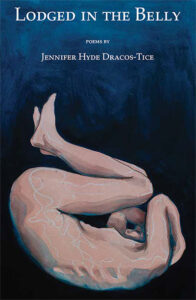 Review by Jesse Breite
Review by Jesse Breite
Rediscovering Motherhood: A Review of Lodged in the Belly by Jennifer Hyde Dracos-Tice
“I want to see the afterbirth” writes Jennifer Hyde Dracos-Tice in the opening poem of Lodged in the Belly (Main Street Rag, 2024), the debut collection from longtime Atlanta teacher and Writing Center director. The speaker wants to see what tends to be dismissed in the event of a birth, that biological matter which nurtures the baby before it separates from the mother, also the conduit of genetic inheritance. Dracos-Tice calls the afterbirth an “Amnion mantra ray, filter and feeder” and the placenta, a “ruddy braid”, “purple wizened hand”, and “purple heart aswirl” (1). Though the doctor says “focus on your baby”, she wants to look upon the zoomorphic and miraculous innards that have been overlooked and dismissed in her family legacy.
Following a poem that breaks birthing room etiquette, Dracos-Tice invokes her mother’s presence in a poem of table manners. “Mom” she begins, “extend permission beyond/the grace you’ve already given/to tell these stories” (5). Further, she asks her mother to sit and laugh as she gets a second helping of her past. The poet resurfaces and re-serves the family history in a different manner and flavor than it was served the first time. Here we understand a newfound gratitude and respect for what has happened after birth in the Hyde family.
The first two sections of this collection reconstruct past family trees with a special empathy for the speaker’s mother. At times standing in to tell her mother’s childhood documentary and at times addressing her directly, Dracos-Tice tells the story of her mother’s resilience despite a disorienting childhood defined by loss, separation, and abuse. “Mom, I dream you/float out the upstairs window”, Dracos-Tice writes, translating her mother’s resilience into flight—her buoyant release from fraternal abuse. And in the last poem of the section entitled “Marianne, Uncontained”, Dracos-Tice observes her as a nurse, mother, and grandmother unburdened by the past. These poems attend to the narrative and emotional gaps with nursing support, empathetic awe, and stabilizing form for her mother’s story.
In the final section, “Legacy,” of the book, we come back to the opening scene. With an awareness of her mother’s motherhood, we are more focused on the mother and child than the afterbirth in “Nocturne for Active Labor”. The speaker-mother acknowledges her mother’s words before the laborious push: “We let go […] all inner matter upheld”. The birth is a spiritual release but also clarity. As she addresses her son, she ends with a blessing and a baptism: “I wash you into the light” (46). In the final section, the documentary mystery and searching empathy is replaced by the physical and tactile responsibility of motherhood. This new motherhood outlasts her first marriage and rediscovers identity in a relationship and marriage to another woman. In “Holding the Heat”, the speaker considers her new lover’s child and asks “What would I lose if I held/her heat, pushed her thin frame/into my breast and belly?” The question is rhetorical and ironic. As she gains a new partner and is liberated from her first marriage, she also gathers her new lover’s children into her maternal body—the resilient body inherited from her own mother.
As the speaker turns toward familial wholeness (or holiness), we are invited into a short evolution of perspective. The whole book has been about this business—taking dangerous and hurt shards and turning them into a mosaic. The kids play as Prometheus (her son says “go ahead, eat my liver”) or as zombies. These are just kids, but they are also a product of past creativity handed down or past lives resurrected to live in a new blend. “How do you heal a family? You don’t.” Dracos-Tice declares, but she also softens: “family is always […] transforming”. And the final poem names it: “Mosaic for my Mother, 2021”. Dracos-Tice pieces her mosaic together finally for my mother, also the dedication of the book. But this book is for mothers and for all the dangerous and resilient beauty of mothers.
The narrative arc and anecdotal vignettes of Lodged in the Belly are quite compelling alone, but the formal poems (we have spells, invocations, erasure, found poems, odes, and nocturne here!) also provide flourishes of lyricism reminding us of the poet’s sonic and promethean versatility. Dracos-Tice spills the family dirt in such fine pieces as “Do Not Pass Go” at the same time as her mothering spirits keep the twiggy crown of the female cardinal from the cat’s maw. Buy, read, and re-read this book!
Lodged in the Belly by Jennifer Hyde Dracos-Tice
Main Street Rag, 2024, $15,
ISBN: 9781964277127
Jesse Breite’s recent poetry has appeared in Tinderbox Poetry Journal, The Pinch, Terrain, and Rhino. His first full-length poetry collection is forthcoming from Fernwood Press. Jesse teaches high school in Atlanta, Georgia, where he lives with his wife and two kids. More at jessebreite.com.
